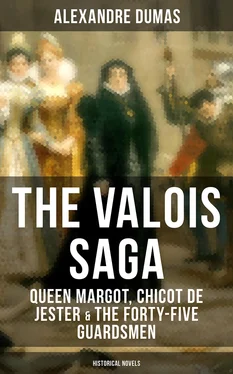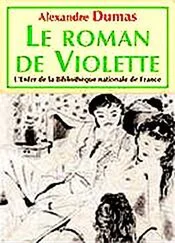Change thy mind and tokens give —
Kisses from thy honey mouth!
Else when thou art like to die
Thou ‘lt repent thy cruelty,
Filling all my life with drouth!”
Marguerite listened with a melancholy smile; then when the student’s voice was lost in the distance, she shut the window, and called Gillonne to help her to prepare for bed.
Chapter 3.
The Poet-King.
Table of Contents
The next day and those that followed were devoted to festivals, balls, and tournaments.
The same amalgamation continued to take place between the two parties. The caresses and compliments lavished were enough to turn the heads of the most bigoted Huguenots. Père Cotton was to be seen dining and carousing with the Baron de Courtaumer; the Duc de Guise went boating on the Seine with the Prince de Condé. King Charles seemed to have laid aside his usual melancholy, and could not get enough of the society of his new brother-inlaw, Henry. Moreover, the queen mother was so gay, and so occupied with embroidery, ornaments, and plumes, that she could not sleep.
The Huguenots, to some degree contaminated by this new Capua, began to assume silken pourpoints, wear devices, and parade before certain balconies, as if they were Catholics.
On every side there was such a reaction in favor of the Protestants that it seemed as if the whole court was about to become Protestant; even the admiral, in spite of his experience, was deceived, and was so carried away that one evening he forgot for two whole hours to chew on his toothpick, which he always used from two o’clock, at which time he finished his dinner, until eight o’clock at night, when he sat down to supper.
The evening on which the admiral thus unaccountably deviated from his usual habit, King Charles IX. had invited Henry of Navarre and the Duc de Guise to sup with him. After the repast he took them into his chamber, and was busily explaining to them the ingenious mechanism of a wolf-trap he had invented, when, interrupting himself —
“Isn’t the admiral coming to-night?” he asked. “Who has seen him today and can tell me anything about him?”
“I have,” said the King of Navarre; “and if your Majesty is anxious about his health, I can reassure you, for I saw him this morning at six, and this evening at seven o’clock.”
“Aha!” replied the King, whose eyes were instantly fixed with a searching expression on his brother-inlaw; “for a new-married man, Harry, you are very early.”
“Yes, sire,” answered the King of Navarre, “I wished to inquire of the admiral, who knows everything, whether some gentlemen I am expecting are on their way hither.”
“More gentlemen! why, you had eight hundred on the day of your wedding, and fresh ones join you every day. You are surely not going to invade us?” said Charles IX., smiling.
The Duc de Guise frowned.
“Sire,” returned the Béarnais, “a war with Flanders is spoken of, and I am collecting round me all those gentlemen of my country and its neighborhood whom I think can be useful to your Majesty.”
The duke, calling to mind the pretended project Henry had mentioned to Marguerite the day of their marriage, listened still more attentively.
“Well, well,” replied the King, with his sinister smile, “the more the better; let them all come, Henry. But who are these gentlemen? — brave ones, I trust.”
“I know not, sire, if my gentlemen will ever equal those of your Majesty, or the Duc d’Anjou’s, or the Duc de Guise’s, but I know that they will do their best.”
“Do you expect many?”
“Ten or a dozen more.”
“What are their names?”
“Sire, their names escape me, and with the exception of one, whom Téligny recommended to me as a most accomplished gentleman, and whose name is De la Mole, I cannot tell.”
“De la Mole!” exclaimed the King, who was deeply skilled in the science of genealogy; “is he not a Lerac de la Mole, a Provençal?”
“Exactly so, sire; you see I recruit even in Provence.”
“And I,” added the Duc de Guise, with a sarcastic smile, “go even further than his majesty the King of Navarre, for I seek even in Piedmont all the trusty Catholics I can find.”
“Catholic or Huguenot,” interrupted the King, “it little matters to me, so they are brave.”
The King’s face while he uttered these words, which thus united Catholics and Huguenots in his thoughts, bore such an expression of indifference that the duke himself was surprised.
“Your Majesty is occupied with the Flemings,” said the admiral, to whom Charles had some days previously accorded the favor of entering without being announced, and who had overheard the King’s last words.
“Ah! here is my father the admiral!” cried Charles, opening his arms. “We were speaking of war, of gentlemen, of brave men — and he comes. It is like the lodestone which attracts the iron. My brother-inlaw of Navarre and my cousin of Guise are expecting reinforcements for your army. That was what we were talking about.”
“And these reinforcements are on their way,” said the admiral.
“Have you had news of them?” asked the Béarnais.
“Yes, my son, and particularly of M. de la Mole; he was at Orléans yesterday, and will be in Paris tomorrow or the day after.”
“The devil! You must be a sorcerer, admiral,” said the Duc de Guise, “to know what is taking place at thirty or forty leagues’ distance. I should like to know for a certainty what happened or is happening before Orléans.”
Coligny remained unmoved at this savage onslaught, which evidently alluded to the death of François de Guise, the duke’s father, killed before Orléans by Poltrot de Méré, and not without a suspicion that the admiral had advised the crime.
“Sir,” replied he, coldly and with dignity, “I am a sorcerer whenever I wish to know anything positively that concerns my own affairs or the King’s. My courier arrived an hour ago from Orléans, having travelled, thanks to the post, thirty-two leagues in a day. As M. de la Mole has only his own horse, he rides but ten leagues a day, and will not arrive in Paris before the 24th. Here is all my magic.”
“Bravo, my father, a clever answer!” cried Charles IX.; “teach these young men that wisdom as well as age has whitened your hair and beard; so now we will send them to talk of their tournaments and their love-affairs and you and I will stay and talk of our wars. Good councillors make good kings, my father. Leave us, gentlemen. I wish to talk with the admiral.”
The two young men took their departure; the King of Navarre first, then the Duc de Guise; but outside the door they separated, after a formal salute.
Coligny followed them with his eyes, not without anxiety, for he never saw those two personified hatreds meet without a dread that some new lightning flash would leap forth. Charles IX. saw what was passing in his mind, and, going to him, laid his hand on his arm:
“Have no fear, my father; I am here to preserve peace and obedience. I am really a king, now that my mother is no longer queen, and she is no longer queen now that Coligny is my father.”
“Oh, sire!” said the admiral, “Queen Catharine”—
“Is a marplot. Peace is impossible with her. These Italian Catholics are furious, and will hear of nothing but extermination; now, for my part, I not only wish to pacify, but I wish to put power into the hands of those that profess the reformed religion. The others are too dissolute, and scandalize me by their love affairs and their quarrels. Shall I speak frankly to you?” continued Charles, redoubling in energy. “I mistrust every one about me except my new friends. I suspect Tavannes’s ambition. Vieilleville cares only for good wine, and would betray his king for a cask of Malvoisie; Montmorency thinks only of the chase, and spends all his time among his dogs and falcons; the Comte de Retz is a Spaniard; the De Guises are Lorraines. I think there are no true Frenchmen in France, except myself, my brother-inlaw of Navarre, and you; but I am chained to the throne, and cannot command armies; it is as much as I can do to hunt at my ease at Saint Germain or Rambouillet. My brother-inlaw of Navarre is too young and too inexperienced; besides, he seems to me exactly like his father Antoine, ruined by women. There is but you, my father, who can be called, at the same time, as brave as Cæsar and as wise as Plato; so that I scarcely know what to do — keep you near me, as my adviser, or send you to the army, as its general. If you act as my counsellor, who will command? If you command, who will be my counsellor?”
Читать дальше












